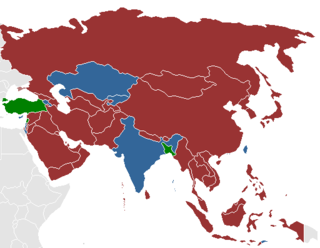Radical feminism is a perspective within feminism that calls for a radical re-ordering of society in which male supremacy is eliminated in all social and economic contexts, while recognizing that women's experiences are also affected by other social divisions such as in race, class, and sexual orientation. The ideology and movement emerged in the 1960s.

A sex worker is a person who provides sex work, either on a regular or occasional basis. The term is used in reference to those who work in all areas of the sex industry.

Sex tourism is the practice of traveling to foreign countries, often on a different continent, with the intention of engaging in sexual activity or relationships in exchange for money or lifestyle support. This practice predominantly operates in countries where sex work is legal. The World Tourism Organization of the United Nations has acknowledged that this industry is organized both within and outside the structured laws and networks created by them.

Sexual objectification is the act of treating a person solely as an object of sexual desire. Objectification more broadly means treating a person as a commodity or an object without regard to their personality or dignity. Objectification is most commonly examined at the level of a society, but can also refer to the behavior of individuals and is a type of dehumanization.

A sex doll is an anthropomorphic sex toy in the size and shape of a sexual partner. The sex doll may consist of an entire body, or just a head, pelvis, or other body part intended for sexual stimulation. Sex dolls are made from various materials like silicone, TPE, or rubber to replicate a lifelike feel. These materials are chosen for their durability and realistic texture, enhancing the overall experience for users. The parts sometimes vibrate and may be moveable and interchangeable. Sex dolls exist in many forms, but are usually distinguished from sex robots, which are anthropomorphic creations designed to be able to engage in more complex interactions.

David Neil Laurence Levy is an International Master of chess who plays for Scotland, and a businessman. He is noted for his involvement with computer chess and artificial intelligence, and as the founder of the Computer Olympiads and the Mind Sports Olympiads. He has written more than 40 books on chess and computers.

Child prostitution is prostitution involving a child, and it is a form of commercial sexual exploitation of children. The term normally refers to prostitution of a minor, or person under the legal age of consent. In most jurisdictions, child prostitution is illegal as part of general prohibition on prostitution.

Prostitution is legal in India, but a number of related activities including soliciting, kerb crawling, owning or managing a brothel, prostitution in a hotel, child prostitution, pimping and pandering are illegal. There are, however, many brothels illegally operating in Indian cities including Mumbai, Delhi, Kolkata, Pune, and Nagpur, among others. UNAIDS estimate there were 657,829 prostitutes in the country as of 2016. Other unofficial estimates have calculated India has roughly 3 million prostitutes. India is widely regarded as having one of the world's largest commercial sex industry. It has emerged as a global hub of sex tourism, attracting sex tourists from wealthy countries. The sex industry in India is a multi-billion dollar one, and one of the fastest growing.
The feminist sex wars, also known as the lesbian sex wars, sex wars or porn wars, are collective debates amongst feminists regarding a number of issues broadly relating to sexuality and sexual activity. Differences of opinion on matters of sexuality deeply polarized the feminist movement, particularly leading feminist thinkers, in the late 1970s and early 1980s and continue to influence debate amongst feminists to this day.
Robot ethics, sometimes known as "roboethics", concerns ethical problems that occur with robots, such as whether robots pose a threat to humans in the long or short run, whether some uses of robots are problematic, and how robots should be designed such that they act 'ethically'. Alternatively, roboethics refers specifically to the ethics of human behavior towards robots, as robots become increasingly advanced. Robot ethics is a sub-field of ethics of technology, specifically information technology, and it has close links to legal as well as socio-economic concerns. Researchers from diverse areas are beginning to tackle ethical questions about creating robotic technology and implementing it in societies, in a way that will still ensure the safety of the human race.

Prostitution in Mexico is legal under Federal Law. Each of the 31 states enacts its own prostitution laws and policies. Thirteen of the states of Mexico allow and regulate prostitution. Prostitution involving minors under 18 is illegal. Some Mexican cities have enacted "tolerance zones" which allow regulated prostitution and function as red-light districts. In Tuxtla Gutiérrez, capital of the state of Chiapas, there is a state-run brothel at the Zona Galáctica(Galactic Zone). In most parts of the country, pimping is illegal, although pimp-worker relationships still occur, sometimes under female pimps called "madrotas"("Big Mothers"). The government provides shelter for former prostitutes.

The sex industry consists of businesses that either directly or indirectly provide sex-related products and services or adult entertainment. The industry includes activities involving direct provision of sex-related services, such as prostitution, strip clubs, host and hostess clubs and sex-related pastimes, such as pornography, sex-oriented men's magazines, women's magazines, sex movies, sex toys and fetish or BDSM paraphernalia. Sex channels for television and pre-paid sex movies for video on demand, are part of the sex industry, as are adult movie theaters, sex shops, peep shows, and strip clubs. The sex industry employs millions of people worldwide, mainly women. These range from the sex worker, also called adult service provider (ASP), who provides sexual services, to a multitude of support personnel.

Sex robots or sexbots are anthropomorphic robotic sex dolls that have a humanoid form, human-like movement or behavior, and some degree of artificial intelligence. As of 2018, although elaborately instrumented sex dolls have been created by a number of inventors, no fully animated sex robots yet exist. Simple devices have been created which can speak, make facial expressions, or respond to touch.

Prostitution laws varies widely from country to country, and between jurisdictions within a country. At one extreme, prostitution or sex work is legal in some places and regarded as a profession, while at the other extreme, it is considered a severe crime punishable by death in some other places. A variety of different legal models exist around the world, including total bans, bans that only target the customer, and laws permitting prostitution but prohibiting organized groups, an example being brothels.

Cyborg anthropology is a discipline that studies the interaction between humanity and technology from an anthropological perspective. The discipline offers novel insights on new technological advances and their effect on culture and society.
Feminist views on sexuality widely vary. Many feminists, particularly radical feminists, are highly critical of what they see as sexual objectification and sexual exploitation in the media and society. Radical feminists are often opposed to the sex industry, including opposition to prostitution and pornography. Other feminists define themselves as sex-positive feminists and believe that a wide variety of expressions of female sexuality can be empowering to women when they are freely chosen. Some feminists support efforts to reform the sex industry to become less sexist, such as the feminist pornography movement.

Mark Coeckelbergh is a Belgian philosopher of technology. He is Professor of Philosophy of Media and Technology at the Department of Philosophy of the University of Vienna and former President of the Society for Philosophy and Technology. He was previously Professor of Technology and Social Responsibility at De Montfort University in Leicester, UK, Managing Director of the 3TU Centre for Ethics and Technology, and a member of the Philosophy Department of the University of Twente. Before moving to Austria, he has lived and worked in Belgium, the UK, and the Netherlands. He is the author of several books, including Growing Moral Relations (2012), Human Being @ Risk (2013), Environmental Skill (2015), Money Machines (2015), New Romantic Cyborgs (2017), Moved by Machines (2019), the textbook Introduction to Philosophy of Technology (2019), and AI Ethics (2020). He has written many articles and is an expert in ethics of artificial intelligence. He is best known for his work in philosophy of technology and ethics of robotics and artificial intelligence (AI), he has also published in the areas of moral philosophy and environmental philosophy.

Kate Devlin, born Adela Katharine Devlin is a Northern Irish computer scientist specialising in Artificial intelligence and Human–computer interaction (HCI). She is best known for her work on human sexuality and robotics and was co-chair of the annual Love and Sex With Robots convention in 2016 held in London and was founder of the UK's first ever sex tech hackathon held in 2016 at Goldsmiths, University of London. She is Senior Lecturer in Social and Cultural Artificial Intelligence in the Department of Digital Humanities, King's College London and is the author of Turned On: Science, Sex and Robots in addition to several academic papers.
Although prostitution in Morocco has been illegal since the 1970s it is widespread. In 2015 the Moroccan Health Ministry estimated there were 50,000 prostitutes in Morocco, the majority in the Marrakech area. Prostitutes tend to be Moroccan women from lower socioeconomic backgrounds as well as migrants from sub Saharan Africa, many of whom are victims of human trafficking UNAIDS estimated the figure at 75,000 in 2016.

Feminist perspectives on sex markets vary widely, depending on the type of feminism being applied. The sex market is defined as the system of supply and demand which is generated by the existence of sex work as a commodity. The sex market can further be segregated into the direct sex market, which mainly applies to prostitution, and the indirect sex market, which applies to sexual businesses which provide services such as lap dancing. The final component of the sex market lies in the production and selling of pornography. With the distinctions between feminist perspectives, there are many documented instances from feminist authors of both explicit and implied feminist standpoints that provide coverage on the sex market in regards to both "autonomous" and "non-autonomous" sex trades. The quotations are added since some feminist ideologies believe the commodification of women's bodies is never autonomous and therefore subversive or misleading by terminology.















